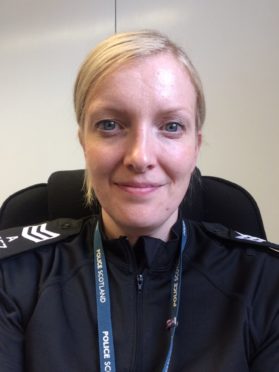It can take a long time to pluck up the courage to report a crime – but police in Aberdeen say it’s never too late to investigate and bring those responsible to justice.
Often victims of crimes can be reluctant to report what happened to them.
However, there are different ways for crimes to be reported – and there’s support services available.
Police Scotland and other organisations have been highlighting the hidden harms of crime.
Victims suffering in silence
The main service police refer victims and witnesses to is Victim Support Scotland (VSS).
Speaking about those affected by hidden harms, Sergeant Kim Wood from the safer communities team said: “Harm inflicted is often not recognised by the victim, and even when it is, it is rarely reported.
“Those suffering might not be able to acknowledge or accept what is happening to them, whilst others keep it hidden from everyone – even friends and family can’t see what is going on.
“Often there is perceived disgrace associated with their circumstances, and because of this stigma they will sadly continue to suffer in silence, feeling ashamed and unable to speak up.”
‘Reporting a crime can take courage’
“Reporting a crime takes courage, and it can often take months, if not years, to come forward, but we want to change that.
“If you are a friend, family member or colleague of someone you are worried about, or you are concerned that something just doesn’t seem right, please don’t be afraid to ask them.
“Let them know you are there for them and encourage them to report what is happening. Help and support is available. It is never too late for any crime to be reported, investigated and perpetrators dealt with.”
Police will provide every victim of crime with their rights in respect of accessing victim support services, and issue them with a victim care card.
Any witnesses impacted by crime will also be offered the same rights as a victim.
Officers and support staff provide initial support, and also make sure safety advice is available and tailored to any individual reporting crime.
- If you think a crime is being committed, contact police on 101, or 999 in an emergency.
- The Police Scotland online reporting form can be found here
- Victim Support Scotland can be reached via the webchat in its site or by calling its helpline on 0800 160 1985
- To contact Crimestoppers call 0800 555 111 or use the online form
Where to turn to for support
Victim Support Scotland can provide a range of services to help those affected by crime.
The charity has trained and experienced volunteers helping people in person, over the phone and in the courts throughout Scotland.
It provides a range of services to help people dealing with the impact of crime:
- Emotional support
- Financial assistance through its Victims’ Fund
- Helping to navigate the criminal justice process
- Conducting safety risk assessments
- Supporting people to attend court
- Informing people of their rights as a victim or witness
- Advocacy service
- Liaising with other services to help people move forward after a crime
Kate Wallace, CEO at VSS, said: “Crime can have a devastating emotional, practical and financial impact on the lives of victims, witnesses and their families.
“Dealing with and understanding trauma after a crime is a very difficult journey to go through alone. Victim Support Scotland provides a safe space where you can talk about what you’re going through without fear of judgement or repercussions.
“We can provide support that is bespoke to your needs, at a pace that suits you. Please contact us for a confidential chat on 0800 160 1985 or visit www.victimsupport.scot.”
How VSS helps those in need in north-east
A mum fleeing from her abusive partner has told of the support she received from VSS.
The woman and her son left the family home after emotional and physical abuse from her partner became more intense during the Coronavirus lockdown.
Her partner was at home all the time and used the restrictions to control her behaviour further and prevent her or her son from leaving the house.
Unable to stay with friends or family during lockdown, she needed help to find accommodation and essentials like bedding to keep her son warm and safe as she escaped her abusive partner.
Her son found the change in circumstances difficult to deal with and felt anxious about spending time outdoors.
Support provided by VSS
She contacted the charity looking for support. A VSS support worker gave her a safe space to talk about what she was experiencing and how overwhelmed she was by her situation.
The support worker contacted the police to get a full understanding of what had happened with her abusive former partner and conduct a risk assessment. With her permission, her support co-ordinator contacted the local Women’s Aid, which found her and her son safe accommodation.
Women’s Aid worked with the woman to help her apply for different benefits.
VSS applied to its Victims’ Fund to support her with her immediate needs.
She was also able to apply to the Victims’ Fund for a new mobile phone. This was essential to severing contact with her abusive partner. But it meant she could keep in contact with her friends and family, as well as her VSS support worker.
Her support worker has given her resources and coping mechanisms to help her improve her mental health. The support worker meets her regularly to talk, and is available by phone if she needs support.
‘I was getting flashbacks…I needed help’
The woman says she feels safer and more secure, and able to support her son through his struggles during lockdown.
She said: “My whole experience was a rollercoaster of emotions and feelings. I was getting flashbacks, nightmares and anxiety attacks.
“I came to VSS because I needed help with what I was going through. My VSS support worker believed me and never made me feel that I was causing hassle or wasn’t important.
“She reminded me that none of this was my fault and that my son and I didn’t deserve to be treated like this. With her help I am rebuilding my confidence and feeling stronger.”
Crimestoppers provides anonymity
National charity Crimestoppers provides third party anonymous reporting.
Its call centre, based just outside London, receives thousands of calls every year.
The charity can’t take information from victims, as that would mean the loss of anonymity. However, it can transfer them on to other services.
This year alone has seen the charity’s highest number of calls in Scotland .
The national manager in Scotland for Crimestoppers, Angela Parker said: “This year (2021) we have received the biggest number of calls ever in Scotland, so 16,500 compared to just over 14,000 last year.
“We think that’s due to covid and have experienced a high number of calls around domestic abuse and drugs. Drugs form the biggest part of information that comes into Crimestoppers most information comes in on our online form.”
Angela explained how the charity keeps the people who call in anonymous.
She said: “We always say you are 100% anonymous so that means we don’t trace or record any calls coming in and we don’t trace IP addresses.
“We have never broken our guarantee of anonymity in over 34 years of operating across the UK and Scotland.
“It’s just a way for anyone who knows or suspects about crime and they just don’t want to go to the police, they don’t want to get involved, make a statement, be a witness in court. This is just a clear and simple way to pass on that information.”
‘It removes that barrier’
Angela continued: “Some of the calls we get are on behalf on someone maybe suffering from domestic abuse, we can’t take calls from victims but we can take it from third parties. So it may be a friend, relative or neighbour.
“It’s the same with drink driving. You might know a regular drink driver, you might be close to them, it might be a family member – it removes that barrier by giving information that is 100% anonymous.”
Once that initial call is made the information is passed on to police. And the charity puts measures in place to make sure the identity of the caller remains secret by “sanitising” the details.
That means if there is only one person who would know specific details about, for example, where exactly in an address drugs are kept, that detail is removed and just given as drugs and the address they are at.
‘It’s all sanitised and passed to police’
Angela said: “It’s all sanitised and passed on to Police Scotland or other law enforcement for them to investigate, they will look into it and then return on that information.
“There could be a mental health issue there or a child welfare visit made. Not necessarily everyone is an arrest or charge – there’s a bigger picture.”
There’s also something in place for young people to give information. Its youth programme Fearless, provides anonymous reporting. This removes the stigma of being seen as a ‘grass’. something which may prevent youngsters from coming forward.
Angela said: “The youth programme is the only way for young people aged 11-18 in Scotland to give information about crimes. It’s all online through a form. Young people can give us information if they know or suspect anyone involved in crime. Often they are seen as a grass or a snitch, but this removes that label as such as no one will know you sent it, unless you tell them.”




